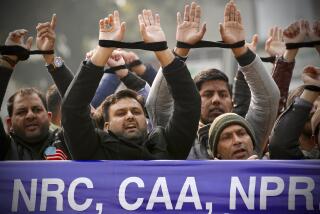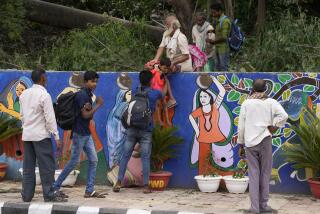Anti-Begging Law Defies Hindu Tradition
- Share via
NEW DELHI — When the traffic light turned red, Selvaraj hobbled on crutches through a maze of fuming cars and tapped a taxi window. “Give me a rupee, sir,” he said.
Selvaraj, a polio victim, used the universal language--empty fingers raised to the lips to show hunger. The Western tourist in the cab understood and gave Selvaraj a dollar bill.
“Yesterday, the whole day, I didn’t get a single coin; today I am rich,” he said, carefully tucking the dollar into his purple sarong. He would trade it for 20 rupees at a tea stall.
Beggars are as common in this city of 9 million as the sacred cows that wander freely in the streets. The maimed men, the ragged women and children, cluster on street corners, occupy the steps of temples and descend in packs on hapless visitors to New Delhi’s tourist sites.
Begging is sanctioned in the Hindu religion--those who give alms are promised a place in heaven--but is outlawed in 16 of India’s 25 states, punishable by up to 10 years in jail. A 1961 ordinance banned it in New Delhi and the other six federal territories.
The beggars have persisted, however, growing ever more numerous and intrusive. They have become such a nuisance and embarrassment in the capital that a new law was been prepared for the winter session of Parliament.
It broadens the definition of beggars to include street performers and those who exhibit deformities to solicit contributions. It forbids accepting money, food or clothing.
Proponents argue that the bill focuses on rehabilitation, not punishment. Beggars would be sent to correctional centers to learn such trades as candle making, bookbinding or carpentry.
“We plan to give a more human touch to the law,” said Satish Kumar Batra, head of the New Delhi social welfare department. “We realize that poverty is not a crime.”
Critics say the legislation goes against Hindu tradition and does not help the destitute, who have no other way to survive.
Under the proposed new law, the maximum sentence would be reduced to five years. It makes targets of gangs that organize beggars and take part of their earnings as “protection.”
The existing law is rarely enforced. Fewer than 500 people are convicted of begging each year.
According to government figures, the number of beggars in New Delhi has risen from 1,000 in 1971 to about 10,000. Social activists put the figure at 60,000, however, and officials acknowledge privately that the high figure is more accurate.
All of the dozen beggars interviewed said they had not washed for several days or tasted milk for years. Some live in the open, others in shanties.
Selvaraj’s possessions consist of his wooden crutches, a spare sarong, a vest and two shirts. On a good day, when he earns 30 or 40 rupees, he puts some aside toward a visit to his home in southern India.
Krishnan, a 60-year-old leper, has begged outside a Hindu temple for 30 years.
His main diet is two pieces of fried flat bread and curry provided daily by Trilok Chand, an employee of the telephone company. Other worshipers donate fruit, rice or an occasional coin, and chauffeurs of the wealthy sometimes give him tea.
When told the proposed legislation would make it illegal to accept such gifts, Krishnan asked:
“What’s wrong? I am helpless and someone wants to help me, so what is the government’s problem? It is my stomach. It is my profession.”
More to Read
Sign up for Essential California
The most important California stories and recommendations in your inbox every morning.
You may occasionally receive promotional content from the Los Angeles Times.













